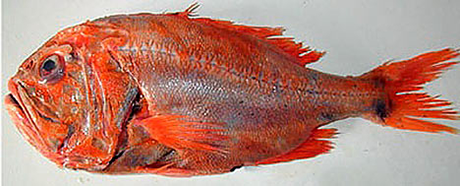
Every once in a while, an urban neighborhood ditches its gritty old identity and gentrifies by way of a sleek new name. Scruffy South-Central has now disappeared from California maps, replaced with the more dignified "South Los Angeles." Who knows what condo sellers are starting to call the Downtown Eastside of Vancouver as they push their new condo developments?
The rename game is working the same way for seafood. Slimeheads weren't a culinary hit until they became "orange roughy." Today's "spotted sunfish" are yesterday's stumpknockers.
Fishermen off Canada's West Coast once cursed tiny invertebrates that clogged their nets, calling them whore's eggs. Then they realized their little pests were worth big money in Japan. The sushi craze spread across North America where whore's eggs have now been renamed "spicy sea urchin."
Similarly, the same fishermen once discarded their rock crab, also known as mud crabs, until one fishmonger realized that a new name might mean a new market. Rock crab became "peekytoe crab" -- now the darlings of many high end chefs.
Why 'St. Peter's fish' sank
In only a few cases have governments intervened in the renaming frenzy. In the early 1990s, tilapia importers tried to reinvent their product as "St. Peter's fish," since tilapia can be found in Israel's Sea of Galilee and the new name would resonate in the U.S. Bible Belt. The U.S. government denied the evangelical makeover. In 1994, the U.S. government also denied a petition to officially change Patagonian toothfish to Chilean sea bass (toothfish is not at all related to the sea bass).
Industry should be denied the right to makeover its fish because there is far more at stake than a cute name. The renaming of fish confuses consumers as well as complicates trade and fisheries management.
Patagonian toothfish, found in the waters around Antarctica, are in serious decline due to illegal overfishing. In Canada, importers of toothfish confuse the common names Patagonian toothfish and Chilean sea bass, which has allowed 30 to 50 per cent of toothfish imports to enter Canada under a customs code designed for sea bass, an entirely different and unrelated species.
Jon Leibowitz (which "sounded too Hollywood" so he became Jon Stewart) and Calvin Cordozar Broadus (now Snoop Doggy Dogg) decided adopting different names would help them become more popular entertainers. Something similar is happening when original names for some fish are discarded because they don't look appetizing on a menu. "May I recommend the fresh stumpknocker today with a crisp Chardonnay…?" Nice try.
Naming the problem: overfishing
Names like slimehead or mud crab or whore's eggs likely were bestowed upon seafood by people who assumed nobody would want to eat such seafood.
But as demand for seafood has grown and fish in the sea have diminished, we help feed demand and denial by changing the names of fish that sound unfit to eat to sound like fish that are. Spiny dogfish becomes "rock salmon." What's the result? Not good for fish of all kinds. Let's say we want more salmon, but are running short of them. The market gives us a substitute -- "rock salmon" -- but the result is to raise the status of, and make us even hungrier for, real salmon -- thus hastening their demise. In 2002, having run short of old-fashioned Dover sole, the U.K. retailer Marks & Spencer got the nod from government authorities to rename a fish called witch as "Torbay sole." The witch didn't make Dover sole any safer.
"We must recognize renaming seafood for what it really is," says Daniel Pauly, director of the Univeristy of British Columbia Fisheries Center. "A clear symptom of overfishing."
In the meantime, perhaps the trend suggests a new renaming game for all to play. Dogface witch eel. Triplewart sea devil. Ratfish. Acned snake eel. Rotten finger. Fangtooth snake eel. Redspined devilfish. Warteye stargazer.
Got better names for any of these?
What do your taste buds, and wallet, want to call them instead?
Related Tyee stories:
- Finished with Your Fish?
Reviewed: Bottomfeeder: How to Eat Ethically in a World of Vanishing Seafood - Save Our Oceans, Eat Like a Pig
Let's stop wasting tasty fish on animal feed. - Consumers Alone Can't Save Our Fish
It'll take a boat load of votes, too.
Read more: Food, Environment














Tyee Commenting Guidelines
Comments that violate guidelines risk being deleted, and violations may result in a temporary or permanent user ban. Maintain the spirit of good conversation to stay in the discussion.
*Please note The Tyee is not a forum for spreading misinformation about COVID-19, denying its existence or minimizing its risk to public health.
Do:
Do not: